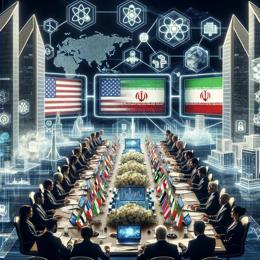Image created by AI
Tensions Rise Amidst Iranian Threats and Regional Security Dynamics
The geopolitical landscape in the Middle East remains charged with tension as Iran's intentions to delay a direct attack on Israel have come to light, linked to a set of temporary factors. With regional stability hanging in the balance, several developments suggest that time may be running out for a peaceful resolution.
Key players, including the United States and Israel, have adopted a deterrent posture aimed at preventing escalation. President Joe Biden and other US officials have implied that the strength of this posture is pivotal in deterring Iran. Notably, the USS Abraham Lincoln carrier strike group's presence sends a "powerful message of deterrence", according to the Pentagon, yet the duration of its deployment remains uncertain.
This deterrent approach, however, may conflict with the 2022 National Defense Strategy, which prioritizes the threats posed by China and Russia, potentially necessitating a realignment of US military focus. The two CSGs located in the Middle East stand in contrast to the absence of such a presence in the Western Pacific, underscoring a potential need for strategic reassessment to address other global challenges.
At the diplomatic helm, newly appointed Iranian Foreign Affairs Minister Abbas Araghchi reasserted Iran's "right" to respond to Israel's assassination of Hamas leader Ismail Haniyeh. Simultaneously, Palestinian group Hamas has signaled a strategic shift, potentially targeting Israeli civilians abroad, leveraging Iran's vast covert network for executing such plans. This comes as Israel attributes "significant progress" to ceasefire-hostage negotiations, though sources indicate Hamas's dissatisfaction with various terms of the proposed US agreement.
Meanwhile, in Iraq, the landscape is similarly complex. Iranian-backed militias have ostensibly signaled a temporary cessation of hostilities against US forces, though contradictory reports suggest that the threat of resumed attacks persists. This fragile detente is supposedly a product of mediation efforts by Iraqi Prime Minister Mohammad Shia al Sudani, attempting to navigate the tense tripartite relationship with the US and the militias.
The internal security situation in Iran's own borders is not without its own volatility. The assassination of a senior police officer in Sistan and Baluchistan Province echoes the broader narrative of regional unrest and anti-regime sentiment.
As these complex dynamics unfold, the Middle East remains a critical focal point of international concern, with global implications contingent on the interplay of strategic decisions, military posturing, and the unresolved tensions between key actors, namely Iran, Israel, the United States, and various non-state players.










